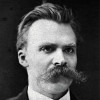“ When a man has to do that which he is best suited to do, which he is most fond of doing, not only clandestinely, but also with long suspense, caution and ruse, he becomes anæmic; and inasmuch as he is always having to pay for his instincts in the form of danger, persecution and fatalities, even his feelings begin to turn against these instincts—he begins to regard them as fatal. ”
Friedrich Nietzsche, Twilight of the Idols (1889). copy citation
| Author | Friedrich Nietzsche |
|---|---|
| Source | Twilight of the Idols |
| Topic | caution persecution |
| Date | 1889 |
| Language | English |
| Reference | |
| Note | Translated by Anthony M. Ludovici |
| Weblink | https://www.gutenberg.org/files/52263/52263-h/52263-h.htm |
Context
“the most spirited instincts inherent in him immediately become involved with the depressing passions, with suspicion, fear and dishonour. But this is almost the recipe for physiological degeneration. When a man has to do that which he is best suited to do, which he is most fond of doing, not only clandestinely, but also with long suspense, caution and ruse, he becomes anæmic; and inasmuch as he is always having to pay for his instincts in the form of danger, persecution and fatalities, even his feelings begin to turn against these instincts—he begins to regard them as fatal. It is society, our tame, mediocre, castrated society, in which an untutored son of nature who comes to us from his mountains or from his adventures at sea, must necessarily degenerate into a criminal.”
source


